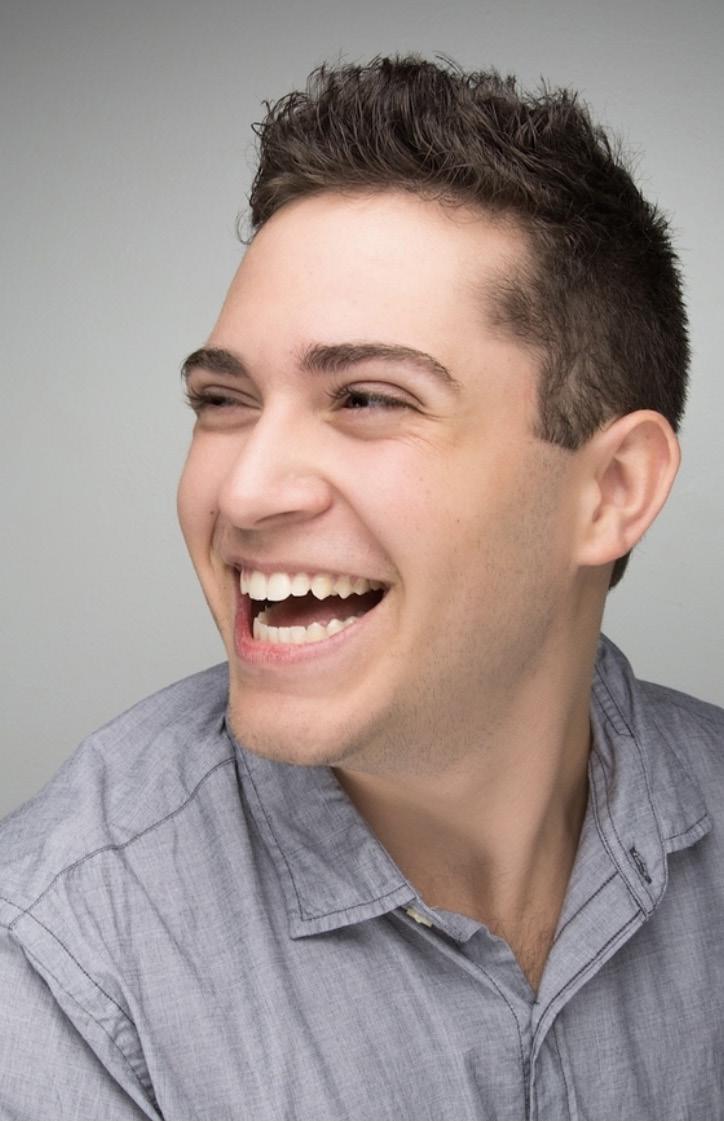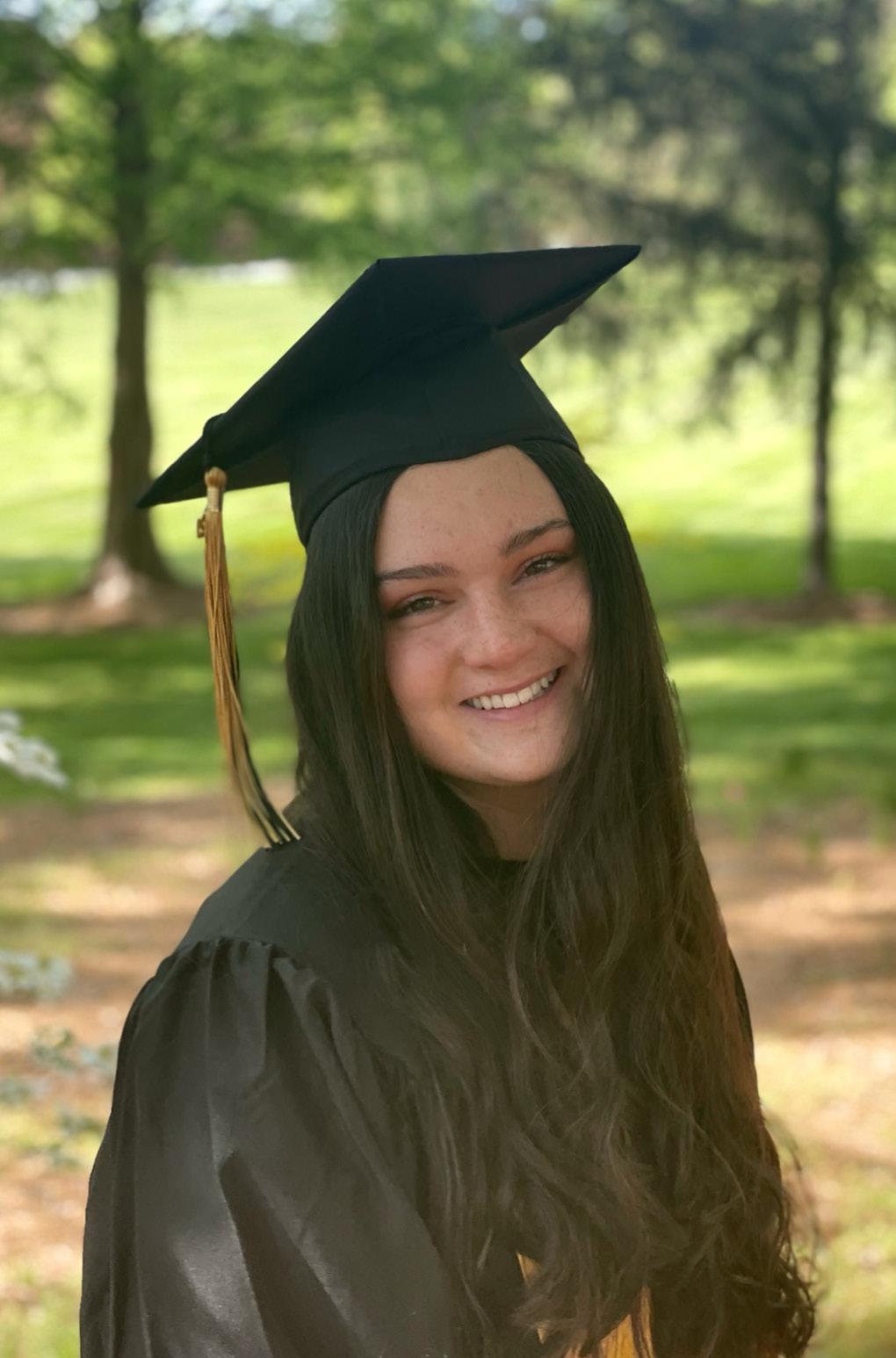
13 minute read
Spanish | Studio Art
SAVARNI SANKA | SPANISH
Photo courtesy of Savarni Sanka
Advertisement
BY AINE PIERRE
News Editor pierav20@wfu.edu
For Savarni Sanka, Wake Forest’s 14th Rhodes Scholar and student trustee, studying the Spanish language is both a means to an end but also deeply enjoyable.
“My favorite part of studying Spanish has probably been the geographic diversity,” Sanka said. “I’ve been able to take classes on medieval Spain and also take classes on the Southern Cone. The major just gives you such a variety of options to choose from. And really, you can learn about so many different aspects of the Spanish language and the people who speak it.”
Sanka chose to major in Spanish both because she loves it and because it will help advance her career goals of working with migrants.
Sanka said that the professor she found to be most influential in the Spanish department was Dr. Sol Miguel-Prendes. The two first met when Sanka sat in on one of her classes as a high school student. Later, Miguel-Prendes taught Sanka’s SPA 280 class.
Miguel-Prendes, for her part, had incredibly high praise for Sanka. “Having Savarni in class was a joy, and I looked forward to chatting with her in the weekly conferences that she asked me to hold for her to practice Spanish,” Miguel-Prendes said. “She is one of the most intelligent, inquisitive and compassionate students I have met, not to mention [she’s so much] fun. During our conversations, I learned about all the teaching and volunteering that she had done over the years. She tutored ESL students and taught Spanish. She mentored Syrian refugees and Indian students, too.”
Miguel-Prendes also shared a riveting story about Sanka’s time abroad. “After her first year at Wake Forest, she got a scholarship to spend the summer in Nicaragua. A few days after her arrival, violent protests started against President Daniel Ortega. [Sanka] wanted to stay to document the demonstrations but the situation became so dangerous that she was forced to leave the country,” Miguel-Prendes said. “She had waited for so long that it was not easy — imagine a petite 19-year-old, alone in a cab taking an hours-long drive through unpaved back roads to skip roadblocks.” Miguel-Prendes recounted that the next semester, Sanka organized a conference on the Nicaraguan protests. For prospective Spanish majors, Sanka had this advice:
“Take as broad of a variety of classes as you can to get that exposure to different regions and different time periods and learning Spanish in different contexts. The department just has so many great professors that if one [learns from] a lot of different professors, they’ll be able to really expand the horizons of their language abilities and their understanding of Spanish and cultures that speak Spanish.”
BY ESSEX THAYER
Sports Editor thayse20@wfu.edu
In high school, Mikey Mattone never really considered Wake Forest an option. His college counselor was the one to put the school on his list.
“I had no expectations for Wake Forest. My dad’s only reaction was that he thought it was a good school. I’d never even been to North Carolina before touring. In the info session, my mom and I were nudging each other the whole time. We were thinking ‘Oh my God, the opportunities,’” Mattone said.
Wake Forest immediately was a draw to Mattone because it offered the ability to try new things and not be forced into a specific school or major right away.
“A big thing for me was that Wake wasn’t somewhere [where I] had to definitively decide what I wanted to do as soon as I entered. Some other universities have [a] College of Arts and Sciences, [a] College of Engineering, [a] College of Business, or whatever. I have a weirdly nerdy side that loves calculus and analytics and math, but I’m also highly creative, like an art major. And so Wake [provided] the opportunity for me to explore both passions,” he said.
Mattone came into Wake Forest with 30 AP credit hours, so he was able to declare his major as a freshman in the spring. This gave him the opportunity to explore different classes, which led him to art.
“My freshman spring, I took a painting class even though I’d never painted before. Just kind of on a whim and a gut feeling,” Mattone said.
Halfway through that painting class, I declared my major. In the class, I had never spent so much time, energy and effort on art that I would consider mediocre. But it challenged me. And I think that’s why I liked it. It wasn’t easy to master at first, and that’s what drew me back,” Mattone said. Outside of the major, Mattone found many other classes that piqued his interest.
“My first semester here, I took an intro to Buddhist traditions that changed the way I think about the world,” he said. “I also took a contemporary history class last semester, that completely changed the way I think about art and the way I make art. But my favorite class is the special topics art history class I took [during] my sophomore spring. It was called Slow Looking American Art, and it really changed the way I interpret art.”
Outside of the classroom, Mattone made an impact on campus as an RA, which was an extremely important endeavor for him.
“I wanted to be involved on campus and I wanted to make a change in some way. As a freshman, I had RAs in my building that [cared about me] and changed my sense of belonging. And I really wanted to make that same difference,” he said.
Also, Mattone was one of the few Wake Forest students to be selected to the Student Union Art Acquisition Committee.
“I and 12 other students had the opportunity to spend a large sum of money to buy art on behalf of the university. It taught me a lot about being passionate and being able to communicate that passion in front of a large group. It was a once-in-a-lifetime type of thing because we had a lot of responsibility and freedom,” Mattone said.
Regarding his art, Mattone is proud to be displaying a show at the Hanes Mezzanine Gallery called Sticks and Stones. He compared it to a thesis in other disciplines.
“I really dove head in with the paintings. For the past few weekends, I was painting for about 18 hours. I wanted to create my own show, it’s not something I can do after graduation,” he said.
Looking ahead to graduation, Mattone is grateful and very proud of his time at Wake Forest.
“I’m very at peace with graduating. I’m very proud of the legacy I’m leaving. I’m proud of the people I’ve influenced and the places I’ve made an impact. But I’m ready for the next stage of life.” After graduation, Mattone will be moving to Madison, Wisc. to begin a position as a full-time project manager at Epic. With the company, Mattone will be on-site at hospitals and healthcare systems launching software.
Of his time in the department, Professor Jay Curley said of Mattone, “It’s been such a pleasure teaching Mikey over the years. His passion, sense of humor and ethical leadership have made him such a vital and important member of classes I’ve taught.”
MIKEY MATTONE | STUDIO ART

BY ALEXANDRA KARLINCHAK
Editor-in-Chief karlae18@wfu.edu
In the era of COVID-19, the performing arts have had to adjust to unprecedented times in a number of unprecedented ways. Senior Emma Szuba is among one of the many performing artists who has witnessed this struggle firsthand — both as a consumer of the arts and as a performer, designer, playwright and director.
Szuba hails from Pittsburgh, Pa. and has been passionate about theatre for as long as she can remember. But her longing to study theatre did not exactly carry over into her desire to attend Wake Forest University — at least, not at first.
Szuba is a third-generation Wake Forest University graduate. Initially, she was reluctant to attend her mother’s alma mater. After she was awarded the prestigious Stamps Scholarship, though, Szuba bit the bullet and put down her deposit for Wake Forest. If you ask her today, she says it is one of the best and most impactful decisions she has ever made.
At Wake Forest, Szuba is a double major in English and theatre. Outside of the classroom, she is involved in Anthony Aston Players (AAP), a student-led organization dedicated to the promotion of service in the performing arts — both at Wake Forest and within the greater WinstonSalem community.
“In all honesty, I spend the majority of my time doing theatre,” Szuba said. “I’ve been in shows, worked on shows [at Wake Forest] and done shows in Winston-Salem with community theater groups here. I play Dungeons & Dragons on the weekends for fun. But I really just do theater.”
Throughout her time as a theatre student, Szuba took a plethora of classes that she says will influence her view of performing arts production for the remainder of her life.
One of these incredibly influential and rewarding classes was Playwriting. Szuba submitted one of the 10-minute plays that she wrote throughout the course of the semester to a 10-minute play competition, and her work was selected to be performed at the Little Theatre of WinstonSalem.
Szuba did not limit her study of theatre within the confines of the campus — or the country. She took the opportunity to study abroad with the English department in London at the Wake Forest Worrell House. While in London, she saw a total of 49 plays. This came out to upwards of six plays a weekend.
“I am realizing while saying this out loud that this makes me sound totally one-noted and absolutely obsessed,” Szuba said, laughing.
But with obsession comes creative genius. Even in the wake of COVID-19, Szuba made it her goal to perform live theatre in some capacity. Ask any person involved with or passionate about theatre and they will tell you how much more genuine live theatre is compared to Zoom.
Szuba’s Honors Project centered around her one true love in the theatre world: Shakespeare.
“My honors project this spring was directing a production of Shakespeare’s ‘The Two Gentlemen of Verona’,” Szuba said. “I wanted a live outdoor production, even under the social distancing requirements, so it was a big challenge. But it was really exciting to do a live performance here again on campus.”
Being able to put together a live production after such a tumultuous time for the performing arts was a powerful experience for Szuba.
“It just felt really poetic in some ways, because, you know, Shakespeare’s theatre was being shut down by the plague all the time,” Szuba said. “And when we were worried about rain, there’s figurative language in the play about rain ruining everything. And obviously, this isn’t the show that we wanted to do. Obviously, we don’t want to be worried about the pandemic.”
Szuba continued: “But afterwards, we kept hearing from people in the audience, ‘I’m just so glad that I got to see a play.’ And that’s what matters.”
Following graduation, Szuba explained that she plans to pursue a career in theatre. But with a freeze on live productions, the conditions needed to meet this aspiration are not present.
“I’ve been joking with my friends that they’ve all got grad school plans. And I’m like, ‘I’m going to adopt a cat this summer,’” Szuba laughed.
“But I want to work in theater, which means playing a little bit of a waiting game [during] this next year as I wait [for everything] to reopen,” she continued. “I would love to get an MFA either in acting or directing. But that’s something for my five-year plan.”
EMMA SZUBA | THEATRE

Photo courtesy of Katie Fox
MAGGIE KUHN| WGSS

BY ALEXANDRA KARLINCHAK
Editor-in-Chief karlae18@wfu.edu
As an older sister with a passion for service, Maggie Kuhn was well-versed in community involvement long before she ever stepped foot on Wake Forest’s campus. And after four years here in Winston-Salem, she will leave campus with an even bigger heart and an even deeper understanding of the world around her.
While Kuhn noted that she took away valuable lessons from all (okay, most) of her coursework at Wake Forest, she made certain to adamantly explain that her relationship with the Department of Women’s, Gender & Sexuality Studies (WGSS) was the most meaningful one she cultivated here.
Kuhn was nominated to be highlighted in this issue of the Old Gold & Black because of the extensive work she has done promoting equality and safety for women both in and beyond the classroom.
“[Kuhn] has done critically important work to address sexual violence at Wake Forest by curating the ‘End the Silence Wake Forest’ blog for the past several years,” WGSS Professor Dr. Kristina Gupta said. “By combining feminist inquiry with social justice activism, Maggie exemplifies the values of WGSS as a department and a field.”
Kuhn’s relationship with the WGSS department began during her freshman year in her First Year Seminar. The class was called I’m Not a Feminist and was taught by Dr. Tanisha Ramachandran. According to Kuhn, it shaped her entire academic career.
“In the class, we just went over basic feminist ideals, but we applied them to things that were around us all the time,” Kuhn said. “I honestly wanted all freshmen to take that as a seminar class, because it really changed my perspective of everything.”
Kuhn estimated that, including herself, there were 13 total girls in the class.
“It was really powerful, just kind of sharing experiences with Dr. Ramachandran,” Kuhn reflected. “And she was validating these experiences and thoughts every time we would talk about them, which is what made it so powerful.”
This was the first truly personal experience Kuhn underwent in college. And, as she found out, it would be far from her last.
“I started studying Women, Gender and Sexuality Studies and had a minor before I even knew it because I loved the classes so much,” Kuhn explained, optimism echoing in her voice. “I signed up for [WGSS classes] without even knowing that I was following a path or an academic course. That’s how I knew that I should keep with it.”
Kuhn said that one of the most interesting WGSS classes she took was a class about men, masculinity and power. Before this class, Kuhn admitted that she did not know much about masculinity studies. Afterward, she walked away feeling educated.
“It was really cool being in class with guys and seeing them open up about things that were personal to them, because that’s the whole point of the class. Before this, I had only been in those types of classes with women.”
Outside the classroom, Kuhn has spent the past four years at Wake volunteering at the Office of Civic and Community Engagement, serving as a SPARC leader and coordinator, working at the Women’s Center and running and curating End the Silence Wake Forest, a blog and social media movement where sexual assault survivors can anonymously post their stories for closure.
Kuhn hopes to go to grad school in the future.
“I would want to go to grad school to get the tools to change policies or work on the interpersonal and cultural sides of operations and businesses,” Kuhn said.
Kuhn made a point to thank the WGSS department for all of the support and knowledge they extended to her throughout her time at Wake Forest.
“While pursuing the WGSS major, I think the biggest thing that I’ve learned is how to ask questions and not just accept what people tell you as fact to actually be fact,” Kuhn said. “I’ve learned about how there are systems that make people believe things that they don’t have to believe in the simplest terms. That opened up a whole lot for me.”










